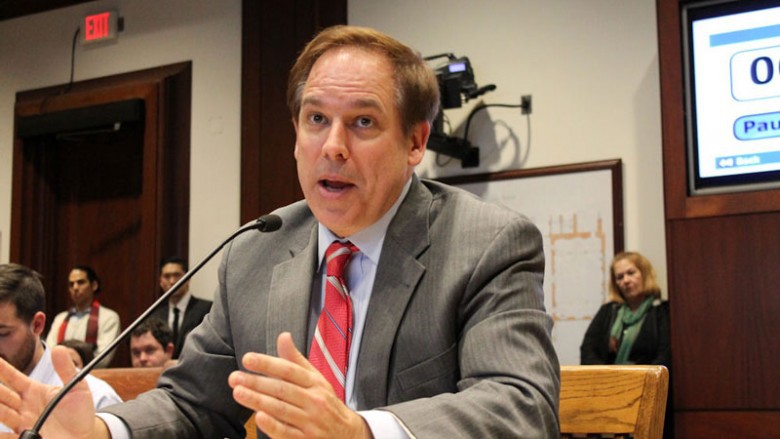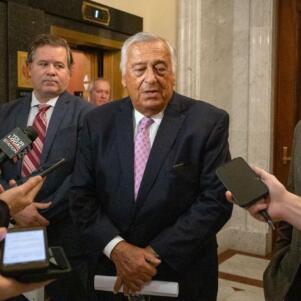Pot legalization backers remind lawmakers clock is ticking
By State House News Service | January 13, 2016, 18:09 EST
 Rep. David Rogers testified Wednesday before the Judiciary Committee encouraging them to take up his bill that would legalize marijuana and establish a tax on cannabis. (Antonio Caban/SHNS)
Rep. David Rogers testified Wednesday before the Judiciary Committee encouraging them to take up his bill that would legalize marijuana and establish a tax on cannabis. (Antonio Caban/SHNS) STATE HOUSE — Buoyed by recent wins at the ballot box and confidence that voters will approve yet another major law in November, marijuana activists on Wednesday told lawmakers that their opportunity to craft legislation to legalize marijuana on their own terms is now.
“The issue facing lawmakers today is not whether marijuana should be legalized, the issue before lawmakers today is how marijuana should be legalized,” said Dick Evans, chairman of the Campaign to Regulate Marijuana Like Alcohol.
The Campaign to Regulate Marijuana Like Alcohol is behind a ballot initiative to legalize adult use of marijuana that appears poised to go to voters in November.
[Audio Clip: Rep. Rogers Testimony]
On Wednesday, Evans testified in support of a bill (H 1561) that would legalize the use of marijuana for adults 21 and older, and establish a system to tax the cultivation and sale of marijuana. The bill, filed by Rep. David Rogers and Sen. Patricia Jehlen, is very similar to the language of the ballot initiative.
Though more than two dozen legislators have co-sponsored the bill, there is little appetite for legalization on Beacon Hill. Gov. Charlie Baker, House Speaker Robert DeLeo and Attorney General Maura Healey all oppose legalization, while Senate President Stanley Rosenberg has called drugs “a third rail” issue and has predicted a bill to legalize marijuana would face long odds in the Legislature.
Marijuana advocates have had marked success taking marijuana reform efforts directly to the voters. Adult use of the plant was decriminalized by voters in 2008 and two years later voters handily approved the medical use of marijuana.
Those successes give activists confidence that voters will again be on their side. If legalization is inevitable, as the activists suggest, then the Legislature should take the opportunity to write a legalization bill itself, rather than be bound by the language of a ballot question, they said.
“This is something that’s coming. It’s coming one way or another, it’s just a matter of time,” Bill Downing, a legalization activist told the Joint Committee on the Judiciary. “I just hope the Legislature takes the reins and does it right.”
Some who testified in support of the Rogers/Jehlen bill said that it is actually a better option than the language of the ballot initiative, which will be the subject of a Judiciary Committee hearing at a later date.
“This bill is a little better than the one coming up on the ballot because it contains an important criminal justice section,” Kathryn Rifkin, of Bedford, said, referring to a section of the bill that would allow for the expungement of marijuana-related convictions from criminal records. “Activists who have been studying this for years would like a seat at the table and we can craft a better bill if we all just buckle down and do our job.”
Rogers, who worked with Evans and others in drafting the bill, said he filed the legislation not because he expects it to pass, but to start a conversation about legalization during a year in which House and Senate members will likely face lots of questions from voters on the topic.
“I think for 80 or 90 years we’ve had a prohibition of marijuana. It’s never worked, it’s never gonna work. And that’s why four states have done it,” the Cambridge Democrat said of legalization. “If you look at the data, it’s probably going to pass here. So let’s talk about it. That’s why I filed the bill, let’s have an honest conversation.”
To prepare for the possibility that voters in November will approve a ballot question legalizing pot in Massachusetts, Sen. Jason Lewis and seven other senators are in Colorado this week to meet with government, public health and industry officials to learn more about that state’s experiences with legalizing marijuana.
“I filed it knowing it’s highly unlikely to become law through the legislative process,” Rogers said of his bill. “If you look at the four states that have legalized marijuana, it’s never been the state legislature … the state legislature didn’t do it, the voters did.”











